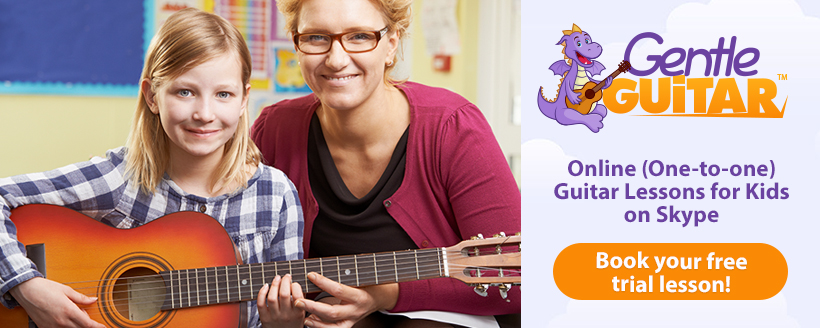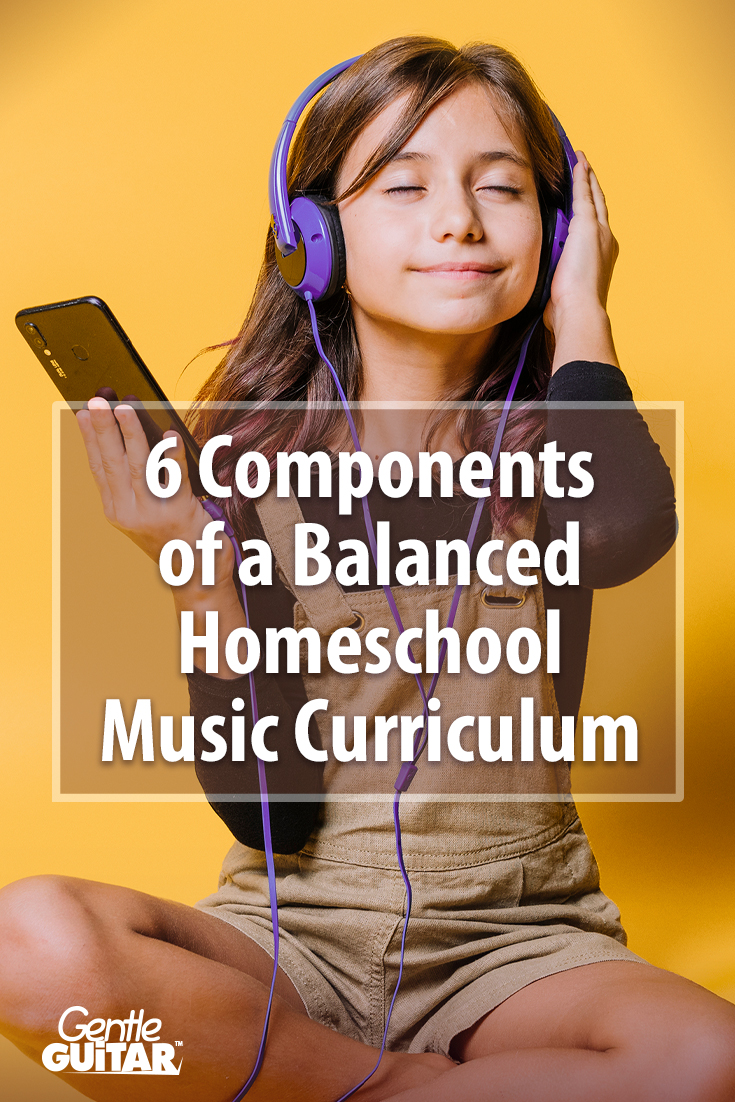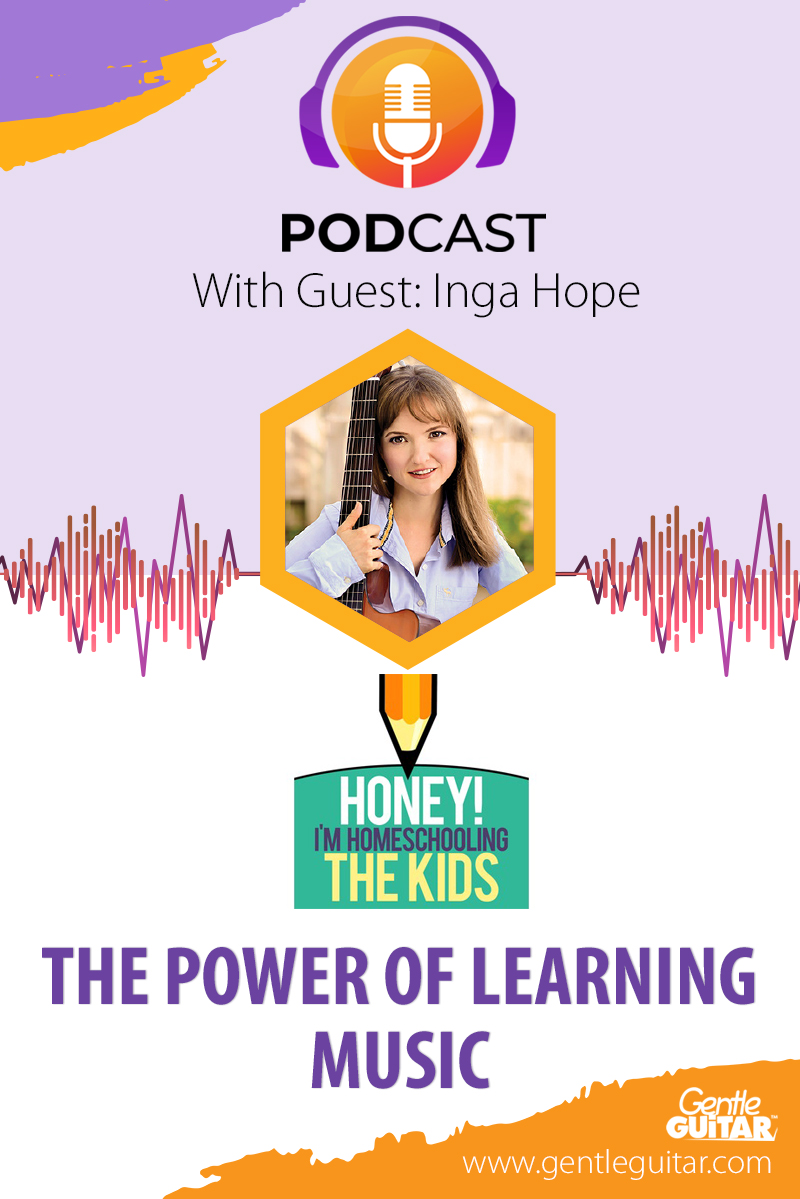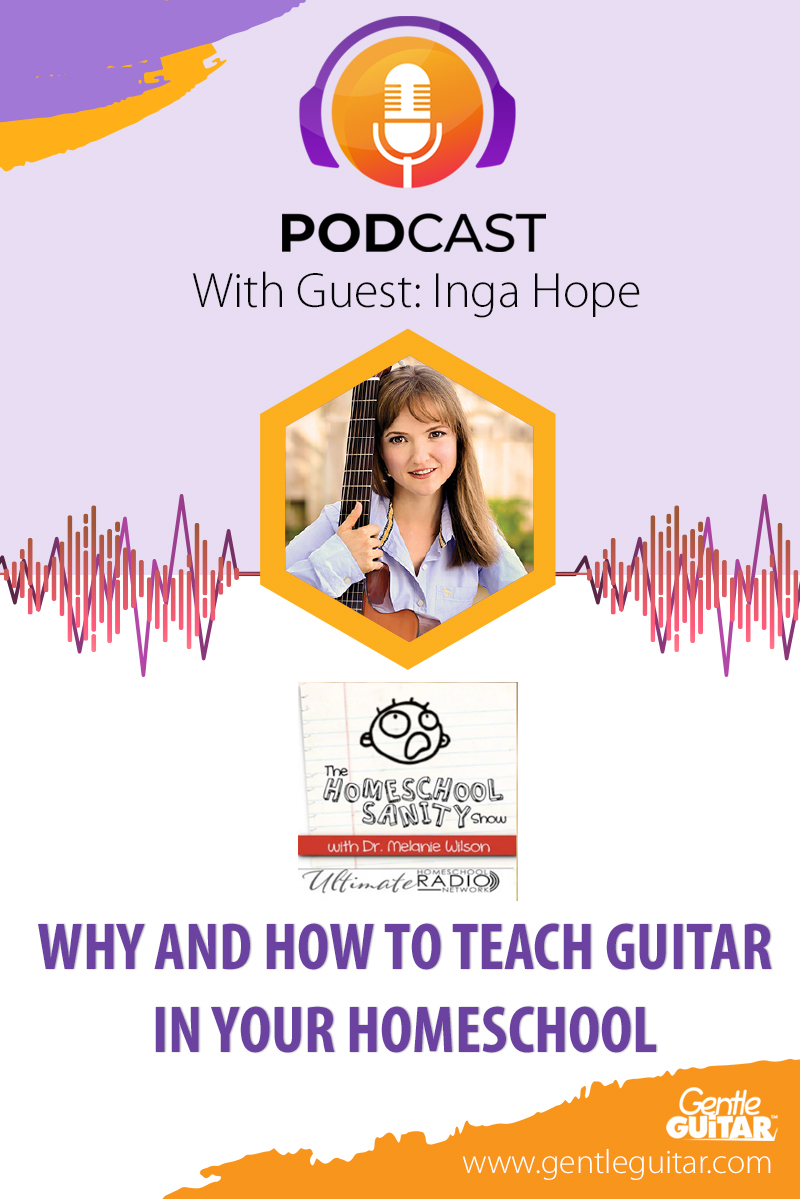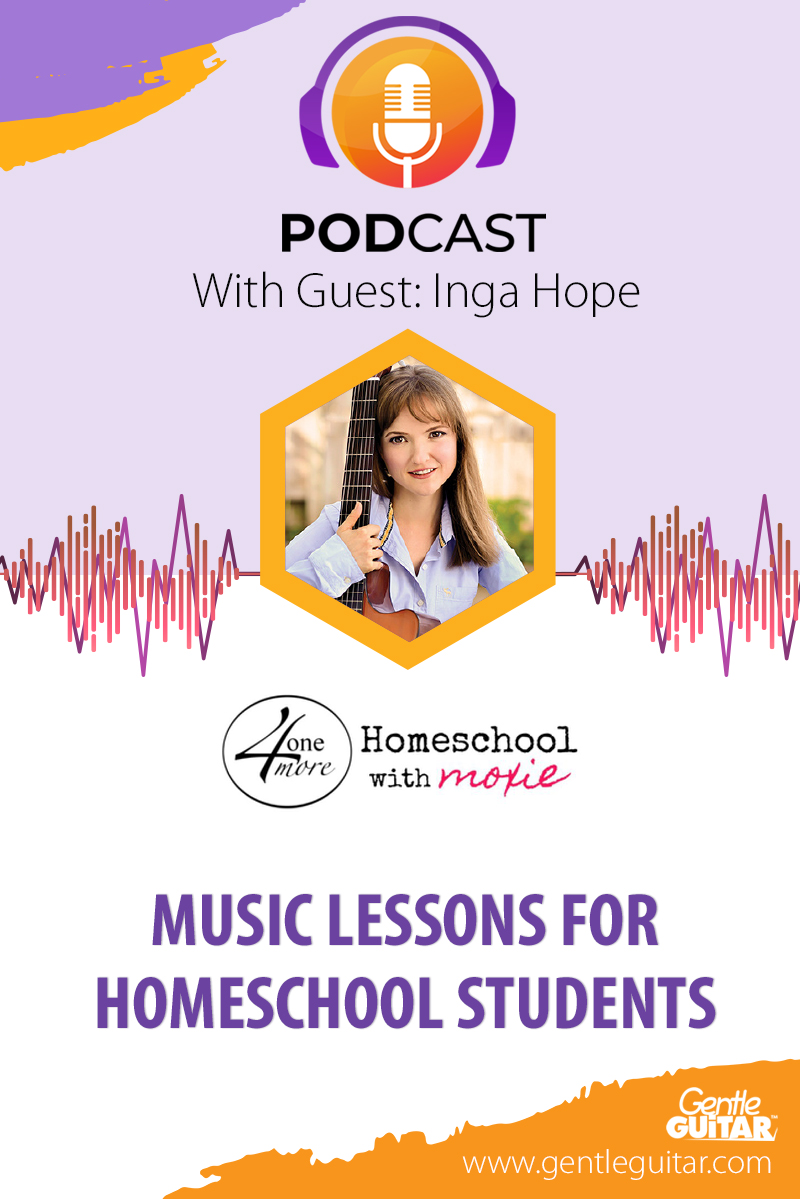The Role of the Parent in Kids Music Lessons
This audio article was created for The Homeschool Solutions Show with Pam Barnhill.
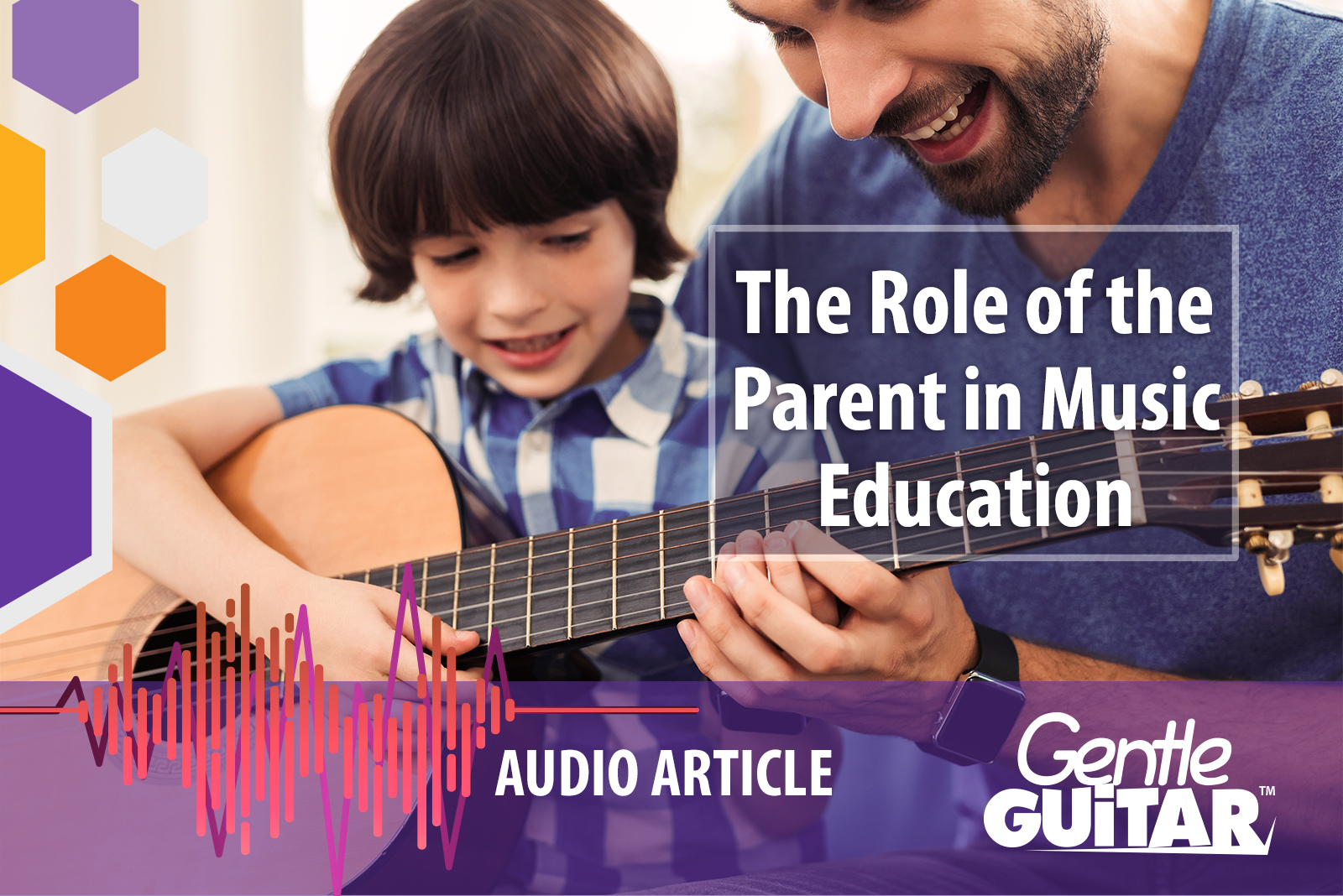
Links mentioned in the article:
Transcription
Transcribed by John Bright
My name is Inga Hope. I am the creator of the Gentle Guitar™ online school for kids where my teachers and I teach guitar to kids all over the world via Skype. A Skype lesson works like any private one-on-one music lesson, only instead of being in the same room with the teacher, the student and teacher can be in different countries – even in different time zones – when they meet live on Skype. Thanks to this video-conferencing technology you can now be anywhere in the world and connect with your favorite teacher.
However, that is not what I’m here to talk to you about. I want to share with you an amazing discovery that I made after I began teaching lessons online. This discovery is about the role that the parent plays in the child’s music tuition. So if you are considering music lessons for your child and wondering where to begin – such as at what age to start and which teacher to choose – or if your child is already enrolled in private music tuition, you’re going to find this information very valuable. That’s what I want to talk to you about today – the role that the parent, other family member or caregiver, plays in the child’s music education.
How many times have you heard the phrase that kids just can’t stick to an instrument long enough? Or that kids like to explore music but don’t like to commit to any one instrument? As a music teacher I hear this complaint all the time. I hear it from parents and I hear it from other music teachers. They just say things like “Oh well, the child quit again! They have a short attention span, that’s just how it is”. But I’m here to tell you “No – that’s not how it is”! It shouldn’t be that way. It’s a fallacy that kids can’t persevere with music or that they can’t stick to an instrument long enough. Absolutely not true. These are just myths. Kids are amongst the most committed people on the planet. Don’t laugh, it’s true, but ………. in order for kids to be committed they need the right structure to be in place. They need systems to help them.
Kids need support. As adults, we are the ones responsible for providing that support, providing the structure so that they can grow and develop into the wonderful, committed, brilliant people that they are meant to be. When I hear stories about a child quitting music lessons, or jumping from instrument to instrument, I don’t think of a child who was unable to commit. Instead I think of adults who haven’t provided the support and nurturing so vital for a child to flourish.
At my online guitar school the teachers and I teach music to kids on Skype. You may think that without the teacher being there in person the lessons couldn’t possibly be effective. However, they are. Before teaching on Skype I taught kids face-to-face in my home studio, but I experienced a significant dropout rate – much higher than now. Why do you think that is? Why is child-engagement so much easier when the teacher is in another country, as opposed to being in the same room? It’s a very good question, one that truly puzzled me when I first started teaching Skype lessons. Then it dawned on me! When working with young kids who are aged five to about 10 plus, it’s not the teacher who plays the most important role – it’s the parent.
Most other music lessons go something like this: once a week the parent brings the child to a music teacher; the parent leaves the child there and sits in the car or runs errands; the parent comes and picks the child up and goes home; the child is then supposed to practice.
In reality, when it’s left up to them most kids (especially the younger ones) tend not to practice. Sometimes they don’t practice because they’re being lazy, or they tell you that there’s something more fun to do. However, I tend to find that young kids don’t practice because they are confused and overwhelmed. They’re not sure what’s required, they often need reminding what they’ve been taught, or they just need someone to help them get going again. So the reason they don’t practice is not because it’s uninteresting, hard or simply “not fun”, they don’t practice because they haven’t got the right motivation or the necessary support to help them practice.
During Skype lessons at Gentle Guitar™ we effectively build a three-way relationship between the parent, the teacher, and the child. We develop this relationship so that during the week (between lessons) the parent fills the role of the teacher. This means instead of only getting a 30 minute lesson once a week the child gets between two to three hours of structured music instruction.
The foundation for this three-way relationship is the interaction that takes place in the Skype lesson. The parent and child both sit in front of the computer while the teacher leads with content and clear explanations. New material is only introduced if the child is ready for it and techniques are described using simple and understandable terminology. The teacher observes the child’s technique closely on the camera, and any necessary corrections are explained patiently to both the child and the parent. This amount of interaction means that when the lesson is over the child and parent don’t feel abandoned or isolated. The parent will have all the necessary knowledge and information to help and support their child in the days leading up to their next lesson. They’ll be able to identify incorrect technique, or recognise when the instrument is not being held properly. I guess you could call it teamwork!
Working together like this means the child remains motivated and eager to get things right. Allowing them to flourish and progress day-by-day makes them happy. It instils a feeling of confidence, and they develop a useful “can-do” attitude. You’ll often hear them say things like “Yes, I did it”! So having the parent being able to support the child outside of that weekly lesson makes all the difference. That is the secret. Getting kids to enjoy their practicing, to enjoy their homework, and to enjoy their music. This is how you get kids engaged and really loving the aspect of practicing just as much as the idea of having lessons.
If you think about it, enrolling kids in music lessons is the easy part. At first they are usually keen and excited, but quite often this doesn’t last. Once the homework comes in the door, the enthusiasm leaves by the back entrance. Practicing starts to feel like a chore, disappointment grows and unhappiness sets in. It doesn’t have to be this way. If your child is about to enrol in music lessons then just prepare yourself to be involved from the start. Whichever teacher you choose to work with, explain to them that you want to be a part of the lesson and that you want to be able to support your child at home. That will make all the difference.
At Gentle Guitar™ we fully embrace this principle of parental involvement as part of our tuition model. I cannot tell you what a huge improvement there has been in our engagement, in our student retention rates, and in the enthusiasm of the kids that work with us. They are so motivated, they love practicing and it’s just a wonderful way for the whole family to enjoy music.
Here’s a little homework for you if your child expresses an interest in music. Maybe they are exploring the idea of learning an instrument, or maybe they want to find out more about a song or tune that they’ve heard. Just engage with them. Ask them questions about it, encourage their interest, be there for them because the moment you start enjoying music with your child is the moment you can begin a special journey of discovery together. Your child’s natural desire to learn and to conquer challenges is simply going to grow and grow. They will gain so much motivation just by seeing you being interested and supportive.
I don’t know why the music education model has strayed so far away from involving the parent and other family members in the process of learning. It’s a huge loss and such a shame because music is not meant to be an activity that you only do within the same four walls. Music is a social activity that’s meant to be joyful. The more that parents can become interested and engaged with the child, the more support they can contribute. If they also begin understanding musical terminology the parent, and other family members, can actually offer guidance. With all this help available to them, the child will become really keen to learn and eager to show off their skills to everyone.
Learning a musical instrument helps to develop a wide range of skills. The process is a physical and academic discipline, similar to karate or martial arts in that it’s a developmental activity which really challenges your child’s abilities. It develops their motor skills. They have to read and interpret something into a fine-tuned physical movement. That can be a real challenge, but when they succeed it gives them such a sense of satisfaction, a sense of joy that’s felt both emotionally and physically throughout the whole body.
We need to consider those emotional factors as well as the physical ones. If the child struggles to play something, for them it seems to be more dramatic than being unable to solve a math problem. Their fingers don’t “listen”. Their own ears tell them the sound is wrong. It’s all very tough for a child. So as adults – music teachers, parents and educators – we need to be there to give support. We need to reassure them that it’s OK to make a mistake and be there to show them how to succeed. We can help them build a positive and useful work ethic.
Crucially, unless you are also learning and understanding what your child is experiencing then it’s difficult for you to offer the correct support that they need at home. The teacher is there only once a week, for 30 minutes. Unless you yourself take part in the three-way relationship then for the rest of the week your child is alone. If you recognise what an important role you can play, just take part in the learning process and be there when your child needs you. I promise that the two of you are going to have so many amazing memories together!
You and your child will bond. You’ll share something simply amazing, really unique and truly beautiful. You don’t have to be musical and you don’t even have to learn how to play a musical instrument. All you have to do is be there during their music lessons and understand what’s happening in your child’s development. It’s pretty easy – simply watch, listen and engage. I sincerely hope that this message has inspired you to want to know more and to want to be a part of your child’s music journey.
You won’t regret it. This opportunity to participate in something together is one of the most beautiful things that we as human beings can experience – connecting, communicating and empathising with each other through a mutual learning process. Learning about music is wonderful, so please, please share it with your child.
I hope you have found this inspiring and motivational and want to find out more. You can always subscribe to the free digital magazine “Music Ed”. In this quarterly publication I share tips, articles and free resources to help parents of musically-active kids engage in and support their child’s tuition.
Additionally, if you’re interested in the Skype guitar lessons that my teachers and I offer to kids and homeschool families all over the world, you are welcome to book a free trial lesson with me. We can meet one-on-one on Skype and I will be your personal teacher. All you need is a reliable internet connection. Kids ages 5 to 8 don’t even need a guitar. During the first lesson we will talk about music theory – the ABC of music. We will clap rhythms, explore what learning music at a young age is all about, and just get to know each other. For older kids ages 8, 9 and over it’s a good idea to have a guitar handy if you want to get full value from the free trial.
Above all else I’m here for you, and would be delighted to answer any questions that you may have. You can reach me at Inga@box5575.temp.domains.

